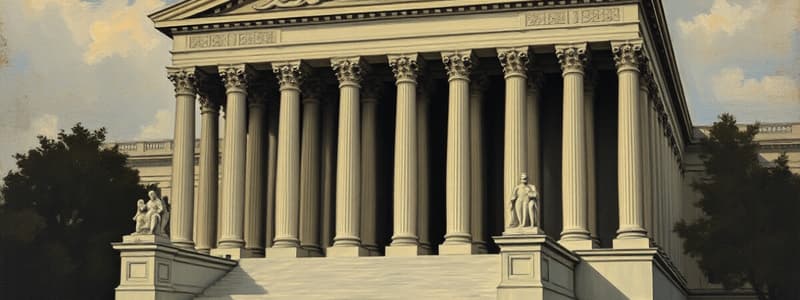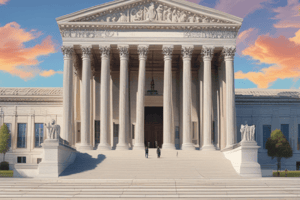Podcast
Questions and Answers
What was the ruling of Brown v. Board of Education?
What was the ruling of Brown v. Board of Education?
- It overturned the Separate but Equal standard. (correct)
- It established the Separate but Equal standard.
- It mandated school prayer.
- It dealt with gender discrimination.
What does Gideon v. Wainwright guarantee?
What does Gideon v. Wainwright guarantee?
The right to a lawyer for defendants who cannot afford one.
What fundamental right was established in Griswold v. Connecticut?
What fundamental right was established in Griswold v. Connecticut?
The right to privacy.
What principle was established by Marbury v. Madison?
What principle was established by Marbury v. Madison?
What is the significance of Miranda v. Arizona?
What is the significance of Miranda v. Arizona?
What was the outcome of Plessy v. Ferguson?
What was the outcome of Plessy v. Ferguson?
What did Schenck v. United States address?
What did Schenck v. United States address?
What ruling did Roe v. Wade provide?
What ruling did Roe v. Wade provide?
What did the ruling in Craig v. Boren address?
What did the ruling in Craig v. Boren address?
What is the significance of Miller v. California?
What is the significance of Miller v. California?
What was established by Lemon v. Kurtzman?
What was established by Lemon v. Kurtzman?
What did Fletcher v. Peck uphold?
What did Fletcher v. Peck uphold?
What was the ruling in McCulloch v. Maryland?
What was the ruling in McCulloch v. Maryland?
What principle did Dartmouth College v. Woodward establish?
What principle did Dartmouth College v. Woodward establish?
What did Gibbons v. Ogden clarify?
What did Gibbons v. Ogden clarify?
What did Korematsu v. U.S. uphold?
What did Korematsu v. U.S. uphold?
What right was guaranteed in Escobedo v. Illinois?
What right was guaranteed in Escobedo v. Illinois?
What was the outcome of U.S. v. Richard Nixon?
What was the outcome of U.S. v. Richard Nixon?
What was significant about Bakke v. Regents of the University of California?
What was significant about Bakke v. Regents of the University of California?
What did Brandenburg v. Ohio determine?
What did Brandenburg v. Ohio determine?
What right was guaranteed by Duncan v. Louisiana?
What right was guaranteed by Duncan v. Louisiana?
What precedent was established by Gitlow v. New York?
What precedent was established by Gitlow v. New York?
What test was provided by Palko v. Connecticut?
What test was provided by Palko v. Connecticut?
What did Mapp v. Ohio establish?
What did Mapp v. Ohio establish?
What was the ruling of Engel v. Vitale?
What was the ruling of Engel v. Vitale?
Flashcards are hidden until you start studying
Study Notes
Landmark Supreme Court Cases
-
Brown v. Board of Education (1954): Overturned "Separate but Equal" doctrine, declaring segregation in public schools unconstitutional.
-
Gideon v. Wainwright (1963): Established the right to free legal counsel for defendants who cannot afford an attorney in felony trials.
-
Griswold v. Connecticut (1965): Recognized an implicit right to privacy in the Constitution, particularly concerning marital relations and contraception.
-
Marbury v. Madison (1803): Established the foundation of judicial review, allowing courts to invalidate laws conflicting with the Constitution.
-
Miranda v. Arizona (1966): Affirmed that individuals in police custody must be informed of their rights to remain silent and consult an attorney.
-
Plessy v. Ferguson (1896): Upheld racial segregation under "Separate but Equal" doctrine, a decision later overturned by Brown v. Board.
-
Schenck v. United States (1919): Introduced the "clear and present danger" test for limiting free speech, particularly in wartime.
-
Roe v. Wade (1973): Decriminalized abortion, asserting a woman’s right to choose based on privacy rights.
-
Craig v. Boren (1976): Set a precedent that gender classifications must have a significant government objective, shifting the standard to intermediate scrutiny.
-
Miller v. California (1973): Defined obscenity and established the LAPS test (Literary, Artistic, Political, or Scientific value) for determining what constitutes as obscene material.
-
Lemon v. Kurtzman (1971): Created the Lemon Test to evaluate government involvement with religion, ensuring it neither advances nor inhibits religion.
-
Fletcher v. Peck (1810): Reinforced the sanctity of contracts, stemming from land disputes in Georgia.
-
McCulloch v. Maryland (1819): Asserted federal supremacy by ruling that states cannot tax the federal government, supporting the constitutionality of the Bank of the United States.
-
Dartmouth College v. Woodward (1819): Upheld the protection of corporate charters under the contract clause, stopping New Hampshire from altering the college's charter.
-
Gibbons v. Ogden (1824): Clarified the scope of the commerce clause, reinforcing Congressional authority over interstate commerce.
-
Korematsu v. United States (1944): Upheld the internment of Japanese-Americans during WWII as a wartime necessity, a decision heavily criticized post-war.
-
Escobedo v. Illinois (1964): Confirmed the right to legal counsel during police questioning, enhancing protections for defendants.
-
U.S. v. Nixon (1974): Limited executive privilege, ruling that the president is not above the law, particularly in the context of judicial processes.
-
Bakke v. Regents of the University of California (1978): Split ruling on affirmative action; upheld race as one factor in admissions but criticized rigid quotas.
-
Brandenburg v. Ohio (1969): Protected inflammatory speech, asserting that advocacy of violence is permissible unless it incites imminent lawless action.
-
Duncan v. Louisiana (1968): Affirmed the right to a jury trial when faced with potential imprisonment of six months or more.
-
Gitlow v. New York (1925): Applied the First Amendment's free speech protections to the states through the 14th Amendment; established the precedent for federalizing the Bill of Rights.
-
Palko v. Connecticut (1937): Determined which parts of the Bill of Rights are essential for liberty, serving as a standard for incorporation.
-
Mapp v. Ohio (1961): Established the exclusionary rule, preventing the use of illegally obtained evidence in court.
-
Engel v. Vitale (1962): Prohibited state-sponsored prayer in public schools, citing the establishment clause of the First Amendment.
Studying That Suits You
Use AI to generate personalized quizzes and flashcards to suit your learning preferences.




